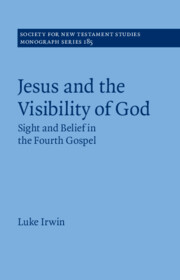Introduction
Published online by Cambridge University Press: 18 January 2025
Summary
The introduction raises the question of how one ought to understand the challenge of God’s invisibility/visibility in the Fourth Gospel with regard to its stated purpose: ‘These things are written that you may believe that Jesus is the Christ, the Son of God.’ Scholars and theologians have often taken God’s invisibility to be ‘absolute’, in the sense that it describes an immaterial, eternal God whose deity is invisible by nature. While John claims that no one has ever seen God, it also describes God as incarnate in Jesus Christ, the one in whom the Father may be seen. The introduction shows that scholars have not yet satisfactorily defined the nature of divine invisibility in John nor reckoned with the import of this important theme for John’s purpose. It proposes that, according to John, God must become physically visible in Jesus in order for belief to obtain.
Information
- Type
- Chapter
- Information
- Jesus and the Visibility of GodSight and Belief in the Fourth Gospel, pp. 1 - 44Publisher: Cambridge University PressPrint publication year: 2025
